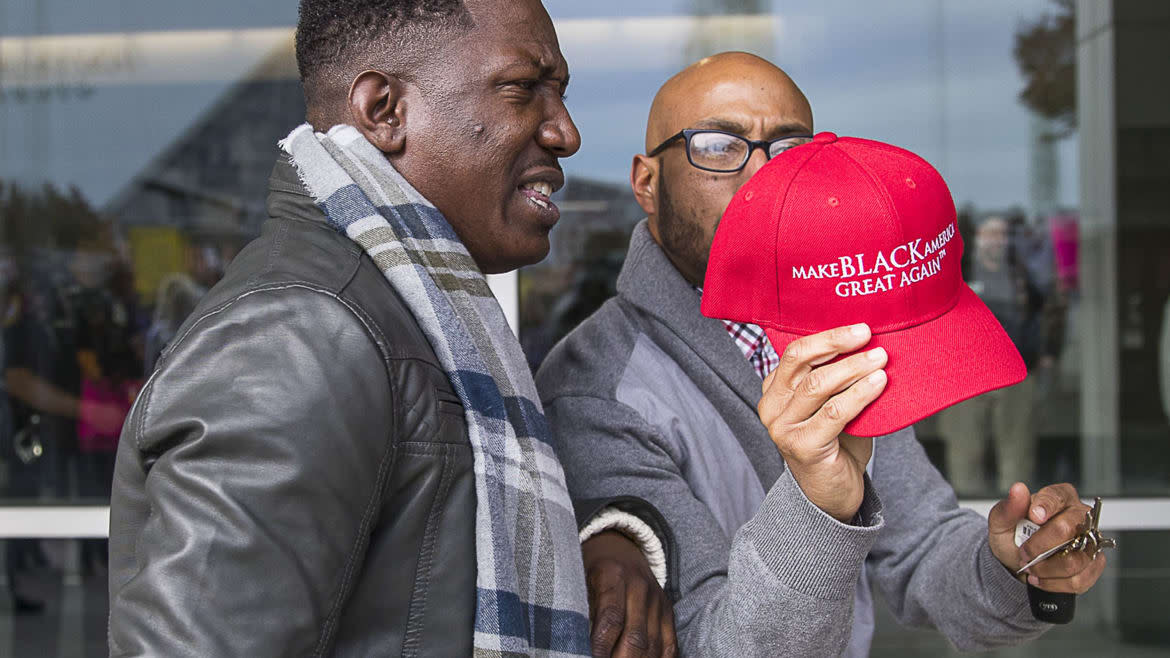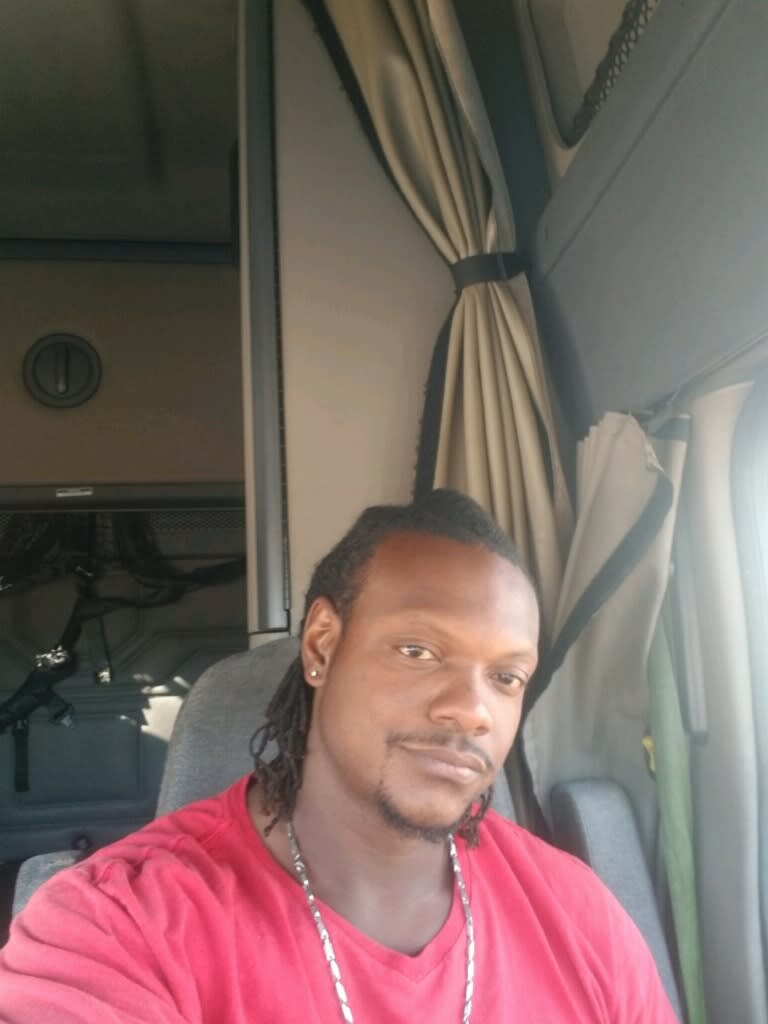Here’s What Trump’s Black Male Supporters Say They See in Him

Desmond Grant, who enthusiastically voted for Barack Obama in 2008 and 2012, sees Donald Trump as a racist. However, that did not stop Grant, a 40-year-old black man, from voting for Trump in 2016.
“Well, I mean I work here with a lot of racist people,” says Grant, who owns a small trucking company in Houston, Texas, where he has lived his entire life. “That’s America. You can’t help it, they’re everywhere. And you know, as long as they don’t disrespect me in my face, they ain’t gonna have no problems. But when we leave here, they can go raising the KKKs and do whatever they wanna do. But as long as we’re on the job, we’re gonna respect each other.”
That outlook doesn’t account for what could happen on a job through a racist coworker’s neighborhood, but Grant says that the climate for small businesses matters more to him than what lives in the president’s heart and mind on race and that his trucking company has thrived in the Trump era. The president, he says, presents an aura of strength that’s more important than the shortcomings his critics focus on.
“He does know how to make money,” says Grant. “He’s not an honest man and he’s not too bright, but he don’t give a fuck. You know what I’m saying? He’s not the most well-spoken but he stands his ground—and that’s part of being a man. He can do that very well.”

A black man speaks favorably about Trump. He certainly must be ready for a scolding from Joe Biden, who proclaimed on The Breakfast Club Friday morning that “if you have trouble figuring out whether you are for me or Trump, then you ain’t black.”
Memo to Biden, who apologized hours later for a remark he said was made “in jest”: Trump won 8 percent of the black vote in 2016—4 percent of the black female vote and 13 percent of the black male vote.
“There’s certainly enough indications in the data to say that African-American men approve of Trump at higher rates than African-American women,” says John Della Volpe, director of polling at Harvard’s Kennedy School of Government’s Institute of Politics. “Biden does better among black women than he does with black men, especially among younger men… Democrats have done a better job of holding onto to black male voters over 50 than they have with younger men.”
In the most recent Harvard Institute of Politics poll of voters aged 18 to 30, 15 percent of black male voters support Trump over Biden compared to only 3 percent of black female voters. “Trump’s presentation of outsider bootstrap success is more inclined to resonate with black men than black women,” says Corey Fields, a professor of sociology at Georgetown University and the author of Black Elephants in the Room. Black women, he says, are less likely to be deceived by Trump as “they see him and his actions through both the prisms of race and gender—not just race.”
Charlamagne Tha God Reacts to Joe Biden’s ‘You Ain’t Black’ Apology
While no one expects Trump to win a majority of black male votes, the party has launched an effort, Black Voices for Trump, to expand support in many states—Michigan, Georgia, North Carolina, Ohio, Florida, Arizona, Texas, Pennsylvania and Wisconsin—where lifting his numbers by a few points could turn a close race.
Democrats should be worried and avoid falling back into the trap of taking the black vote for granted, according to Charles Cherry, Publisher of The Florida Courier, a statewide newspaper covering black communities across the state. “I mean these are quiet Trump supporters. And when you talk to them, you hear them say ‘You know, I don’t like the guy but…’ or ‘he stands with his faith’ or ‘you know where he’s coming from.’ They perceive him as being a strong guy who doesn't give a damn. And from a black male mindset, that's something that some guys like.”
Marcelis Turner, 27, a Detroit native who is now an RNC field director in Wayne County, sees an opening for the president in the Harvard Institute of Politics poll, which also showed black men were more likely to say that the economy is their greatest concern. Turner, who voted for Obama in 2012 and sat out 2016, says there are many voters like him—who didn’t vote in 2016—now drawn to Trump for what the president has done on criminal justice reform and what he can do on the economy.
“We’re looking at this differently than many other generations,” says Turner. “We care about building the economy for ourselves and our communities. I know that is what drew me to Trump.”
The idea that Trump is strong on the economy and projects an image of strength kept coming up in my conversations with black men who are supporting him. “I like Trump because he’s an alpha male’s alpha male,” says Wilfred Rucker, a 60-year-old black Republican voter and Trump supporter in Charlotte, North Carolina. “On the left, it’s more about consensus and compromise. On our side, it’s about winning or losing. Conflict is not to be avoided. The only thing that is to be avoided is losing.”
Rucker says black conservatives consider themselves to be “Americans first, conservatives second, and black third. We just happen to be black. It’s just not important, it’s as important in seeing someone who’s fat, seeing someone who’s tall, seeing someone who wears glasses. It’s an undeniable physical characteristic.”
Rucker broke with his party in 2008 and voted for Barack Obama, and a big hole appears in Rucker’s perspective when he berates 44 for failing to do enough for black people as president: “I thought I voted for the first black president, but I ended up voting for the first half-white president.”
So why does someone who sees black identity as a mere physical characteristic like height expect the first black president to place race at the helm of his agenda? Why does Rucker criticize Obama for failing to do things that his heroic Trump has not done either, like appointing a black Supreme Court justice?
“You’re getting things twisted,” Rucker replies when I raise those questions.
Death or the Democratic Party: For so many elections since 1964, the black partisan mindset has been reduced to that choice.
What was so refreshing about 2008 was the opportunity to finally vote for something—the brilliance of Barack Obama—and not against a Republican like, say, Ronald Reagan, who, in his debate with Jimmy Carter in 1980, said he wanted to return to the racial climate of the ’50s, when there wasn’t a race problem. Of course, Obama’s Republican opponent, John McCain, seemed to at least know that the 1950s was not a decade without a race problem. Rather than try to Willie Horton his way to the White House like the handlers of the elder Bush, McCain stood up to one of his supporters at a rally as he corrected her for insulting the true identity of his opponent, Barack Obama. In 2008, I didn’t feel the need to vote against John McCain. I voted for Barack Obama.
Now, Biden’s comment carries us back to that old model—You’re black and safe (or stuck) with Biden versus Facing the End of the World with Trump. In doing so, Biden gives license to those black Trump men to claim a false space of individuality and bravery in living beyond the limits of racial orthodoxy as if they must know something that is unknown to the rest of black America: “Black millennial men have a familiarity with the president that precedes his time in office,” says Paris Denard, 37, a senior communications adviser for black media affairs at the RNC and an advisory board member for Black Voices for Trump.
“We know him from The Apprentice… We know him from NeNe Leakes talking about cashing Trump checks on Real Housewives Atlanta. We know him from being the subject, in a positive way, in many hip-hop songs. We see him throughout the years with black community leaders and athletes, hip-hop stars and music people. He’s a provider: He is a good father. As a young black man, you admire people who are great fathers… It goes with the type of person and the type of alpha male that he is.”
Denard accuses the liberal news media, in symphony with the Democratic Party, of deliberately plotting to portray Trump in ways that make him repulsive to black female voters, one of the Democrats’ strongest voting blocks. “The real reason why the media is so hellbent on portraying President Trump as a racist is because they know that it’s going to drive down his popularity with women voters if they focus on his tone and his policies about children in ways that are just flat-out false.”
Yet black men, Denard argues, are able to see the true Trump as “not only inspirational but aspirational,” a view that inherently hinges on gender stereotypes bestowing the quality of compassion to black women and rugged wisdom to black men who can see the truths behind those false media portrayals that trick the women. When I raise this point with him, along with how much he sounds like a Bernie supporter talking about how The media was against us, and In the pocket of the Party Establishment, he raises his voice:
“Look, when you turn on the television, you hear and you see a false narrative about the president—about his tone, and about him being racist.”
Black conservatives like Reginald Grant, 32, have a less romanticized view of Trump and the GOP’s campaign to appeal to black voters. Grant, like his first cousin, Desmond Grant, voted for Trump in 2016. Even though he was troubled by some of the president’s behavior during the campaign, Reginald Grant thought he was not “evil” like Hillary Clinton.

“So I kept saying, maybe when he gets to office, he’ll become more of what you think of when you hear the term presidential,” says Grant, a geography teacher in Houston. “I don’t see any type of evolution to him or change in that regard.”
Instead, the president’s “racist response” to the NFL protests was Grant’s breaking point, and, he says, Trump’s poor handling of the pandemic has further highlighted his shortcomings.
Republicans would be doing better with black voters if not for Trump, says Grant, noting that polls consistently show strong threads of conservatism among African-Americans. After all, who ever passes a test with a score of 15 percent? True, but unfortunately for Democrats, Republicans are on a steep curve when it comes to how many black votes they need to shave off of a key Democratic voting block to win in some swing states.
Get our top stories in your inbox every day. Sign up now!
Daily Beast Membership: Beast Inside goes deeper on the stories that matter to you. Learn more.


